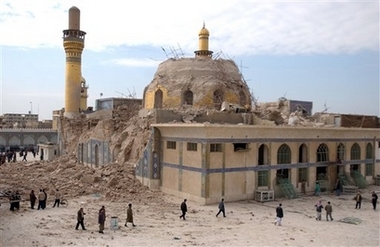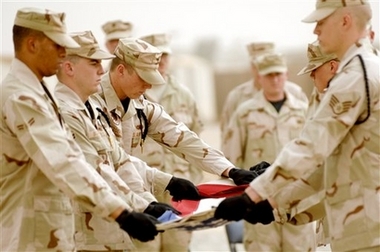Middle East
Pentagon: Iraqi violence still rising
(AP)
Updated: 2007-06-14 10:28
 |
Large Medium Small |
WASHINGTON - Violence in Iraq, as measured by casualties among troops and civilians, has edged higher despite the US-led security push in Baghdad, the Pentagon told Congress on Wednesday.
 Iraqis walk past the damaged Askariya shrine following an explosion in Samarra, 95 kilometers (60 miles) north of Baghdad, in this Wednesday, Feb. 22, 2006 file photo. [AP]  |
The security operation was launched Feb. 14 and is still unfolding as the last of an additional 28,000 or so US forces are getting into position in and around the Iraqi capital. The Pentagon is required by Congress to provide its initial assessment of the operation in July, and Gen. David Petraeus, the top US commander in Iraq, has said he will report in September.
Wednesday's broader report, the eighth in a series, said that while violence fell in the capital and in Anbar province west of Baghdad during the February-May period, it increased in other areas, particularly in the outlying areas of Baghdad province and in Diyala province northeast of Baghdad and in the northern province of Nineva.
The report described Iraq's violence as mainly a result of illegally armed groups engaging in a "cycle of sectarian and politically motivated violence, using tactics that include indiscriminate bombing, murder, executions and indirect fire (rocket and mortar attacks) to intimidate and to provide sectarian conflict."
Unlike the previous such report to Congress, submitted in March, the Pentagon made no reference to the debate over whether Iraq is in a civil war. In March it said "some elements of the situation in Iraq are properly descriptive of a `civil war.'"
It noted that al-Maliki had pledged in January, when President Bush announced his commitment to send more US troops to Baghdad, that there would be no political interference in the security crackdown and no sectarian favoritism.
"To date, operations in Baghdad indicate that Iraqi government delivery on these commitments has been uneven," the report said. "For example, there have been reports of political involvement by some leaders in tactical and operational decisions that bypass the standard chain of (military) command."
The report offered a less-than-optimistic outlook for political reconciliation among the rival sectarian groups in Iraq. It said Shiite fear of a Sunni return to power and splits within the Shiite community "will continue to impede formation of a 'Shiite consensus' and complicate reconciliation with the Sunnis."
On the positive side, the report noted that Sunni Arab tribal leaders in Anbar province, where there is no sizable Shiite population, have been joining with US and Iraqi government forces to fight al-Qaida forces.
"With the right mechanisms, these Sunni leaders could pursue reconciliation with the government of Iraq," the report said, adding that the Sunnis currently are limited in their political effectiveness by a lack of unity.
| 分享按钮 |

